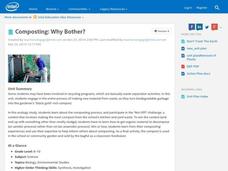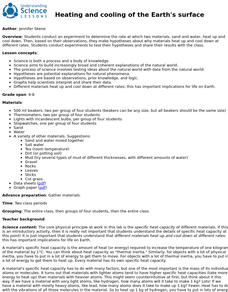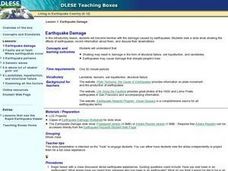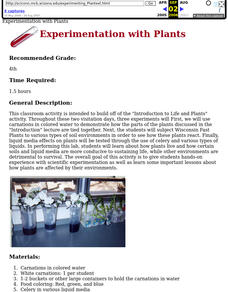Nuffield Foundation
Investigating the Effects of Biochar on Soil Fertility
Breathe some new life into charcoal. Scholars use biochar to improve soil fertility. They test the effectiveness of this addition by conducting an experiment with soil having 0%, 2%, and 4% biochar.
Curated OER
What is Soil?
Students examine soil. In this earth science lesson, students define and describe weathering and erosion as it relates to soil. Students compare and contrast potting soil with forest soil and complete a science observation worksheet.
Curated OER
Soil Morphology
Students analyze images of five different soil types from various locations and discuss how climate, vegetation, parent material, topography, and time can contribute to soil characteristics.
Intel
Composting: Why Bother?
The first STEM lesson in a group of 10 explores composting. After discussing how to make a better tomorrow, classes are challenged to track garbage in their communities, visit a local waste management facility, and conduct a survey about...
Curated OER
Using GLOBE Data to Study the Earth System (College Level)
Students use the GLOBE Website to locate and study environmental data. They use the GLOBE Graphing Tool to display data. Students describe the role of solar energy in the annual fluctuations of soil moisture. They describe reservoirs and...
Curated OER
Making a Soil Separator
Students investigate botany by creating a soil separating device. In this plant life activity, students identify the needs of plants and how important the right soil is in the growing process. Students define different soil types and...
Curated OER
Soils are the Pits!
Students dig soil pits in order to observe soil features and the factors of soil formation and soil forming process. Students also examine the relationships among different soils in a series of soil pits.
Curated OER
Introductory Lesson on How pH Levels are Determined
Students explore pH levels of different substances. In this lesson about pH, students work together in three to four groups to test substances. moving between three different stations performing tests on the substances to determine...
Curated OER
The Formation of Soil
Students identify the different components that make up soil. In this earth science lesson, students create a pamphlet for next year's class. They analyze how erosion and weathering shape the Earth.
K12 Reader
Natural Resources
What natural resources are available in your area? Your learners can consider this question after reading a brief passage about natural and renewable resources. After reading, class members respond to five questions related to the reading.
Kentucky School for the Deaf
Levels of Organization within an Ecosystem
From tiny organisms to entire biomes, young scientists examine the interdependent relationships tying all living and non-living things together with this collection of ecology resources.
University of California
Heating and Cooling of the Earth's Surface
Scholars collect data from heating sand and water before forming testable hypotheses about why sand heats up faster. Afterward, they develop and run experiments to test their hypotheses.
University of Virginia
Analyzing Social Commentary in The Adventures of Huckleberry Finn
The Adventures of Huckleberry Finn continues to be one of the most frequently banned books. The satire and social commentary present challenges when using the book as a core text. Direct readers' attention to how Twain uses plot,...
Curated OER
Exploring The Great Salt Lake
Second graders experiment with sand samples taken from a lake. They use this as part of an inquiry that is based on observations. The properties of the sand are observed in the lab and recorded in writing. Prior to the lab students...
Curated OER
Earthquake Damage
Students identify that shaking may result in damage in the form of structural failure, soil liquefaction, and landslides. They also identify that earthquakes can cause damage that disrupts people's lives. Finally, students view a...
Curated OER
The Earth around Us: Air, Water & Soil
Learners recognize that science is everywhere. In this scientific method lesson, students experiment with height and record their experiment using the scientific method. Learners must identify each step of the scientific method.
Curated OER
Introduction to a Unit on the 1930's Depression in America
High schoolers view and discuss photographic images of the Dust Bowl by Dorothea Lange. They discuss who Dorothea Lange was and why she took the pictures, the conservational factors that contributed to the Dust Bowl and migrant workers...
Curated OER
The Noble Gases
When breaking down the details of the periodic table of elements, this presentation will explain special characteristics for each of the noble gases. The annotations are quite elementary, so this can easily be used in an introductory...
Curated OER
Take the Lead — Get the Lead Out
Students research about the physiological effects of prolonged lead exposure. For this chemistry lesson, students investigate the lead content of different paint, soil and water samples. They analyze data trends and share their findings...
Curated OER
Sedimentary Rocks
Fourth graders discuss the basic properties of rocks, the processes
involved in the formation of soils, and the needs of plants provided by soil. They write descriptions in their Science journal and identify and discuss each type of...
Curated OER
Experimentation With Plants
Fourth graders experiment with different varieties of plants and draw conclusions after performing a series of lab activities. A very helpful student worksheet is given. This is a nicely done introductory lesson for life science.
Curated OER
Water Cycle
Second graders investigate the water cycle. In this water cycle instructional activity, 2nd graders discover how the water cycle effects erosion and weathering. Students create their own terrariums to view the water cycle. Students...
Curated OER
Can Worms See?
Second graders discuss the previously created worm compost and the importance of living creatures to the Environment. For this worm lesson, 2nd graders observe worms and record their sensitivity to light. Students design a petri dish...
Curated OER
Reflection and Absorption of Light
Students use a microcomputer connected to a light sensor and temperature probe to explore the reflection and absorption of radiation for different surfaces. Students follow instructions in this guided inquiry based lab and are then asked...

























